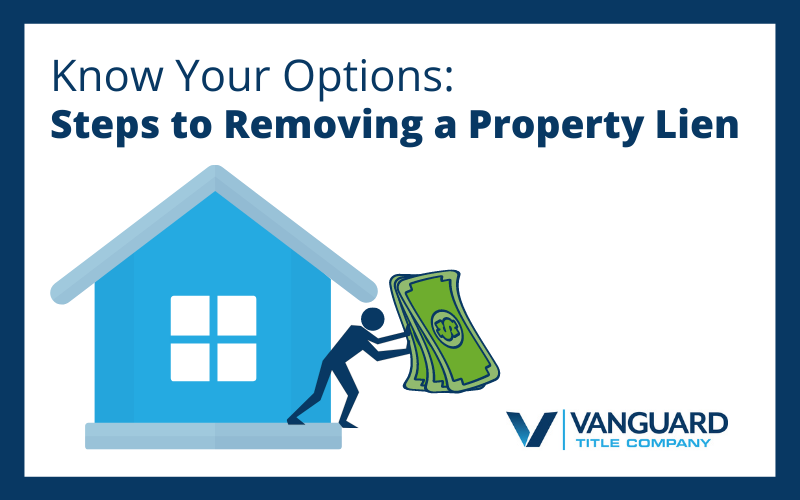By Christina Kass
In our previous blog post, we discussed the various types of property liens and how they may affect you. This month, we’ll take a look at how to remove a lien from a property.
As you may recall, a lien is a legal right or claim against a property by a creditor. Discovering any type of lien on a property during a real estate transaction might make or break the sale. At the very least, it may slow down the transaction and prove to be an inconvenience for buyers, sellers, and mortgage companies alike.
So, what happens when you’re ready to sell your home, but a title search reveals that there’s a lien against it?
After a title company discovers the lien, the real estate transaction will usually be placed on hold and the closing delayed. Once there is a resolution to the lien, the closing for the sale can be scheduled. Bear in mind that if a buyer is getting financing, the buyer’s new mortgage company is not likely to agree to finance the property until a satisfactory resolution to the lien is determined. Likewise, if a buyer is worried that a seller cannot satisfy the lien, depending on their contract, they could decide not to purchase the property.
The good news is that you may still sell the home, but a resolution to the lien must be cleared prior to the sale.
My Property Has a Lien … Now What?
Typically, it’s the responsibility of the seller to pay off the lien on his or her property on or before the day of closing. Most liens are paid off from the proceeds of the sale at the time of closing. While removing a lien can be a complex process, there are several options for doing so, including:
- Pay Off the Lien – Once you determine that the lien is valid, the simplest method for removing it is to pay it off. Even if you need to borrow the funds from family or friends, satisfying your debt will allow the property to become unencumbered, sold, and closed. You may be able to negotiate with the creditor for a reduced settlement amount, depending on the type of debt and the seller’s situation.
- Request a Release-of-Lien Form – After paying off the balance of your debt in full, the creditor will file a release-of-lien form. This will act as evidence that the debt has been paid and will formally release the lien from your property. The form is filed with the county recorder’s office in the county in which the property is located, and the original returned to you.
- Wait for the Statute of Limitations to Expire – In some instances, you can remove a lien without paying off the debt by running out the statute of limitations. For example, the amount of time a judgment lien can remain on your property varies by state. In Michigan, a judgement lien expires five years after the date it’s recorded. With this method, you will still owe the debt, but getting the lien removed frees up the property to be sold.
- Negotiate with the Creditor – It might be possible to work out a settlement, whereby the lien is resolved without full payment. This can be attempted through arbitration, mediation, or informal negotiations.
- File for Bankruptcy – Bankruptcy will likely wipe out your responsibility to pay a secured debt (such as a mortgage), including any deficiency balance; however, you won’t get to keep the collateral (the house, car, or other property) unless you pay what you owe. Bankruptcy, by itself, does not eliminate a lien. If you are considering filing bankruptcy, speak with an experienced bankruptcy attorney who understands the issues you are facing and can help you develop strategies for keeping the assets that are most important to you.
- Obtain a Court Order – At times, liens are obtained through fraud, coercion, bad faith, or other illegal means. If you believe your lien is not valid and the creditor will not rectify the situation, you can file a motion in court and ask a judge to remove the lien. This can be difficult to prove, so clear evidence will be required. If the court agrees the lien is invalid, it will provide an order that can be recorded to show the lien removed from your property.
If the seller is unable to clear the lien in a contractual timeframe, the buyer may legally back out of the deal. However, buyers who have their hearts set on a particular home may decide that it’s worth the extra time and effort to wait for the seller to resolve the matter.
Partner with Your Title Insurance Company
In the case of a federal tax lien, the IRS may agree to let the seller pay off their mortgage first before paying the tax lien. Your title insurance company will then be able to pay off the mortgage and record the discharge of tax lien during the closing. If the IRS doesn’t allow this, then it may be possible that the lender will allow a short sale for the seller to legally sell their home for less than the remaining loan amount. The seller will need to negotiate that short sale using a short sale specialist or an attorney who will deal directly with the lender on their behalf.
Put Vanguard’s Years of Industry Experience to Work for You
The professionals at Vanguard Title understand the ins and outs of property liens — and you can rely on us to conduct an in-depth and exhaustive title search as part of your closing. If there’s a lien, judgement, or other “cloud” attached to your property, we’ll help to uncover it and work with you to clear it. It’s one more way we add peace of mind to your real estate transactions.

